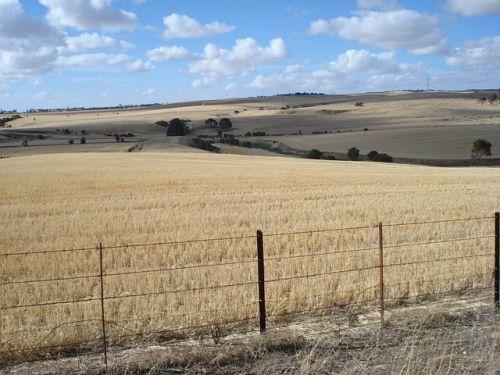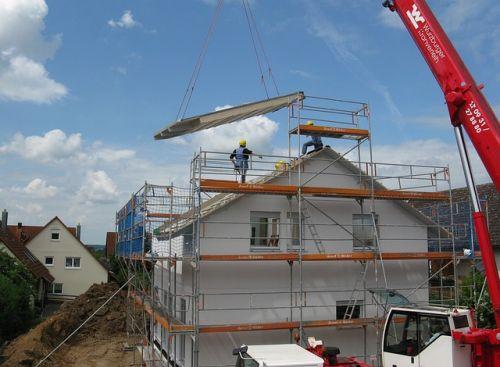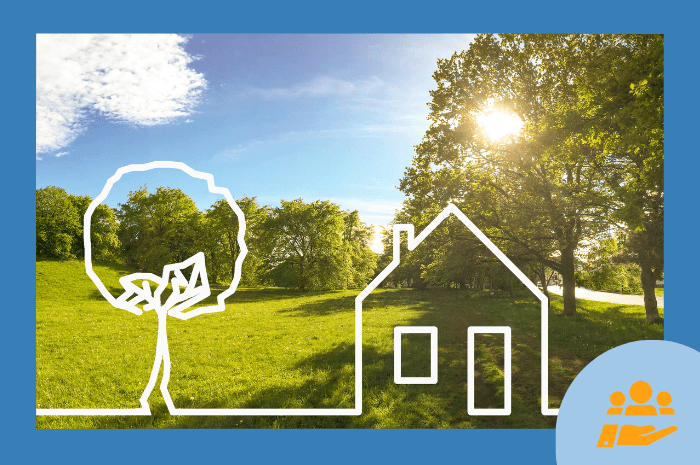Increasing the value of a lot is a relevant strategy if you own one, or if you're planning an investment to resell it at a profit.
So how do you go about it? How do you estimate the value of a lot before you buy it? We will tell you all about it.
Why estimate the value of a lot?
Although the process may seem superfluous, appraising a plot of land facilitates several of your potential goals:
- You own a lot and want to put it up for sale;
- You are planning a future acquisition;
- You own a plot of land and want to know its current value.
What's more, if you take this process seriously, you'll be able to justify your price to potential buyers and add credibility to your offer.

How is the value of a lot determined?
Before trying to increase the value of a plot of land, it is important to know how it is determined.
Analysis of its characteristics
The first step is to analyze the characteristics of the land to determine its value.
Surface area
The area of a property can have a significant impact on its price. As an example, a 10,000-square-foot parcel may be worth less than a 35,000-square-foot parcel.
To be sure of its exact size, don't hesitate to consult the land's certificate of location for cadastral verification.
Orientation
The orientation of a property can also have a significant impact on its cost. For example, if you're planning to build a house, this will help you with your location strategy. Optimizing a single-family home's exposure to the sun can only increase its value.
Soil condition
The condition of the soil is another factor that can affect the value of a lot. One way to do this is to analyze the topography of the land, which is a technique for representing the shape of the land on a map.
Zoning
Another factor to consider is the zoning of the property. A section that allows residential development may be worth more than another with restricted zoning.
Visit the site
It may seem obvious, but take the time to thoroughly analyze the property by visiting the site. This will give you a better idea of the environment in which it is located.
You can do this by visiting the community in which the property is located to identify any nearby services. Then measure the distance between these amenities and your property so that you can include this information in any sale.
Think about the best use
The next step is to determine the best possible use for a vacant lot. Its market value will not be the same if it can be used for housing or farming.
Even if you don't have any major projects planned, you can always highlight the potential of a vacant lot when the opportunity arises.
Municipal assessment of the property
Finally, your appraisal process requires a relevant market analysis. To do this, you will need to look at recent transactions in the area that have similar zoning and development potential to your parcel.
For additional guidance, don't hesitate to rely on municipal assessments. These are done for all properties within each municipality and can give you a more accurate idea of potential prices in an area.

How can I increase the value of my land?
Once you've learned more about the proper valuation method, it's important to understand the strategies for increasing land value. For a homeowner, there are two main maneuvers:
- Take advantage of market trends;
- Be more proactive and develop the lot.
To do this, follow the advice below. They will help you turn your plot of land into a valuable real estate asset.
Use market strategies
Quick buying and selling of the lot
First of all, this method is not exclusive to land transactions. It is used by many real estate investors, especially through the flip mechanism. In the case of a plot of land, the principle remains the same: buy a property to increase its value and quickly resell it at a higher price.
To be successful with this strategy, you'll need to be reactive and position yourself quickly for the right market opportunities. Then, use one of the appraisal techniques below to increase the market value of the property. Finally, the resale phase will allow you to turn a quick profit on your operation.
Long-term purchase/resale
Here, the main quality needed to make a profit is your patience. As far as the type of operation is concerned, the principles are the same as for the quick purchase/resale, with the prior identification of a good opportunity on the market.
On the other hand, you don't implement any specific valuation leverage. You simply wait for the land to appreciate over time. However, a good knowledge of market trends is required. This knowledge will allow you to determine the ideal time to successfully resell your lot so that you can make the best possible deal.
As mentioned above, you'll need to take a longer-term view. The plot of land may be in an area that is likely to increase in value, but you'll have to wait and see. For example, a train station may be planned for the future. So don't give in to the temptation to put the lot back on the market when the time is not right.
What operational strategy for development?
If you want to be more proactive before reselling your plot of land, several operating methods can be used to increase its value during the holding period.
This mechanism allows you to generate income not only on the capital gain but also during the exploitation period. We recommend this strategy if you have time and an extra budget to devote to setting up a business on your property.
Increase the value of your land by changing its zoning
If well thought out, changing the zoning of a property can increase its value. In most cases, this requires a good understanding of local regulations. This will allow you to effectively anticipate your future strategy even before you purchase the lot.
Once you've purchased your property, you'll need to contact the appropriate municipal authority. To improve the profitability of the lot, several zoning options are available in Quebec:
- Residential;
- Agricultural
- Institutional
- Commercial;
- Industrial;
- Mixed Use.
Depending on the change you make, you may be able to build a home, commercial property, or other infrastructure. This strategy allows you to add value to the land by establishing a new activity on it.

Search for underutilized or vacant lot
At the same time, you can further optimize your operation by purchasing land that has been undervalued by the seller. This maneuver involves finding a plot of land with a market value that has not been properly assessed.
While one of the main ways to find one is to search Centris and other private sales sites, you'll have to be resourceful to find the real gems.
For example, you can venture into municipalities to identify lots that are likely to be neglected. This can be evidenced by vegetation that hasn't been maintained for some time, or signs of squatting, such as food wrappers.
If you spot such a plot, ask around and try to locate the owner. Maybe he'd like to get rid of his property and is willing to sell it to you at an attractive price.
In any case, we recommend this strategy to investors with more time and, perhaps, a little less budget. The search can be tedious as good opportunities are few and far between.
Estimating the market value of a developed lot
By now, you're familiar with the benefits of increasing the value of your land and the valuation methods that can be used.
Now let's look at the additional tips you need to know once you've optimized the lot's development potential.
How do you calculate the value of a lot with a house on it?
Once you've built a house, you need to determine the value of both the land and the house. For the latter, use the price of homes with similar features in the neighbourhood. If they have land of the same size as yours, even better.
Then add this value to the value already calculated for the vacant lot to determine its price.
Estimating the value of farmland
To check the value of a piece of farmland, you need to follow the main steps below. The most important thing to check is the zoning. Make sure that the land is in green zoning, which is dedicated to agricultural activities.
The other factors involved in estimating the value of a piece of farmland are more traditional and correspond to:
- Location;
- Nearby services
- Profitability potential;
- Analysis of the local market.
How do you determine the selling price of a property?
Here we are. You've bought and appraised your property, and now it's time to sell it, hoping for a handsome capital gain.
It's important to remember that the selling price depends on all the valuation methods described in this article. Once all these calculations have been made, don't forget to take your situation into account.
For example, you can put your lot on the market at a price slightly higher than the calculated average. We recommend this strategy if you don't have an urgent need to sell. Otherwise, you'll just have to choose a more attractive price.
When negotiating with buyers, don't hesitate to point out the strengths of the property you're selling. Highlight any changes you've made to the property, as well as any price increases in the weeks and months leading up to the sale.
How can I more easily determine the value of a property?
Finally, you may not want to calculate the estimated value of the land yourself. To make things easier, we recommend that you delegate this task to experts. Two types of professionals are qualified to perform this task:
- Certified appraisers;
- Real estate agents.

1. The certified appraiser
On the one hand, the certified appraiser has many skills, such as the training required to determine the value of a property. Their specific knowledge of certain standards enables them to give you reliable advice and avoid mistakes.
It's not uncommon for homeowners to distrust this type of professional. However, an accredited appraiser does not receive additional compensation for valuing a property higher or lower. His or her neutrality guarantees you a reliable appraisal untainted by potential financial interests.
Once the appraiser has completed his or her mission, he or she will prepare an evaluation report that will inform you of the value of the property.
2. The real estate broker
Second, a real estate agent can also give you sound advice on the value of a property. Experienced in real estate transactions, he or she can assist you in buying or selling your lot and help you avoid certain mistakes.
We recommend that you use a professional who knows the local market. This will provide you with potentially more accurate data for analyzing the property in your area. If you're selling farmland, be sure to contact an agricultural real estate professional who has more experience in this specific area.
Realtor or certified appraiser? Our opinion
Faced with these two types of expertise, it's legitimate to ask yourself which professional you should choose for your project.
In our opinion, the choice depends first and foremost on your objectives. If you wish to have your property valued to sell, we advise you to use the services of a real estate agent.
If you don't, we recommend that you use the services of a certified appraiser.
Looking to appraise the value of your lot?
XpertSource.com can help you find a certified appraiser. When you tell us about your project, we put you in touch with qualified resources for FREE. Simply fill out our form ( it only takes a few minutes ) and we will connect you with professionals.

